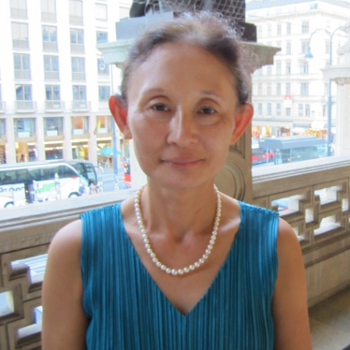Updating an opera such as Salome that is tied to a specific time and place to a modern setting is a tricky business. In Stuttgart Opera’s new production, Russian director Kirill Serebrennikov's placing of the tale of a sex-crazed bloodthirsty teenage princess in biblical times to the living room of a wealthy European house was only the beginning. He put the story squarely in the context of today’s Middle Eastern conflict and Isis-led terrorism... with a twist. Despite some inconsistencies, the production overall was intensely gripping, and challenged the audience to “think outside the box”. As a video screen on the back wall of the stage showed the image of an Islamic terrorist (an actor portraying Jochanaan) clad in orange overalls being beheaded by Herod’s men, one could not help but wonder about an endless cycle of violence that has been the history of mankind.
Salome in this production was depicted as a bored teenager addicted to violent TV anime and costume play. The house was tightly guarded by men with pistols and video monitors. The basement held a Muslim who ranted in Arabic. Serebrennikov made a directorial decision to separate Jochaanan into a voice (splendidly sung by Iain Paterson) and a stage actor (a wide-eyed Yasin El Harrouk). Once I got used to having Mr Paterson sing from the corner of the stage while Mr El Harrouk was mostly being manhandled, I began to wonder if any of Jochaanan’s words about the Messiah might apply not just to Jesus Christ but also to Mohammad.
There were some visual distractions. Herodias openly engaged in a threesome with two bodyguards during the dinner party. Arabic writings flashed on the screen as Jochanaan sang and during the “Dance of the Seven Veils”. Salome did not dance at all, but sat sullenly, dressed in pink tutu and wearing butterfly wings, while Herod and his half-naked servants danced instead. Narraboth did not kill himself, but was shot by one of the men; later he unexpectedly returned to copulate with the page. The screen showed TV coverage of the Middle Eastern conflict, the killings, Isis destruction of cultural heritage, as well as Germany optimistically accepting refugees, and Angela Merkel cheering during a soccer match. These familiar images took on poignant meaning when placed in an opera that depicted human greed and brutality. Are we never to learn from the past but rather perpetuate the folly, not realizing that every event will have unexpected consequences? The final image of the opera was striking in its simple finality. Everyone left Salome alone to complete her monologue to the head of Jochanaan, both on TV screen and in the flesh. She then quietly walked up the stairs leading to her parents’ bedroom and stood at the window to await her executioner with a pistol as the stage went blank.
The musical quality of the performance was excellent. Roland Kluttig led a fresh account of Strauss’ notoriously complex score, emphasizing the clarity of lyrical lines. The woodwinds were exquisite in the crucial beginning as well as the transitional scenes. The brass and percussion brought out the innovative musical structures that were so shocking in 1905. The conducting was at a brisk tempo, the performance clocking at about 105 minutes. Volume was kept under control, so that the singers were never overpowered. It is to the credit of stage direction that most singing was done downstage, close to the front; each singer came across clearly.
The role of Salome requires a soprano to sing in a broad range and yet most of the singing lies in a high tessitura. She is on stage throughout most of the opera, and her extended early scene with Jochanaan and her final monologue, culminating into an exciting vocal climax “Ich have deinen Mund geküsst, Jochanaan” (I have kissed your mouth, Jochanaan), require a dramatic soprano of great stamina. Simone Schneider met the challenge thrillingly. Her dusky voice soared above the orchestra, and while she might have been vocally more mature, she acted as a rebellious teenager.
Iain Paterson brought his impressive vocal charisma to sing a finely nuanced prophet. Matthias Klink was a youthful and clear voiced Herod capable of negotiating the punishing high notes of the role. Claudia Mahnke, wearing a blond wig, was a sensual and deep voiced Herodias, in competition with her daughter for male attention. Smaller roles were well cast and impressively sung.
Above all, this modern day Salome held the audience in perpetual anxiety with its onslaught of actual and anticipated visual violence, well matched by the music that was forever unsettled and visceral. A truly fitting production to our new world of terrorism.




